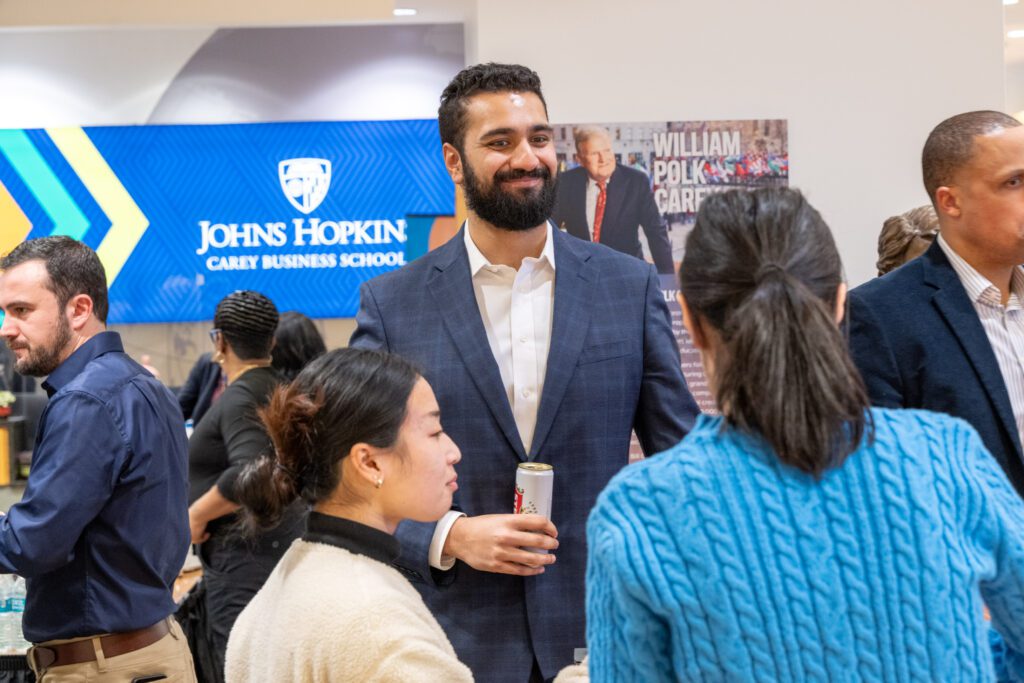Whether you’re venturing into a startup or a Fortune 500 company, there’s no avoiding the incoming era of “data ubiquity.” In five years, consulting firm McKinsey predicts many companies will have data “embedded in systems, processes, channels, interactions, and decision points that drive automated actions (with sufficient human oversight).” In another McKinsey Global Survey on AI, 2024 saw 65% of respondents report that their organisations are regularly using gen AI, close to double the percentage from just 10 months ago.
Between now and 2034, where it’s projected that AI could contribute up to US$15.7 trillion to the global economy, talent who can think and act “data and AI first” are set to be in demand. That’s where the Carey Business School at Johns Hopkins University comes in.
To guide its 30,000 graduates to build for what’s next in a technological world, Carey offers STEM-designated degrees that are forward-thinking, interdisciplinary, and ahead of industry trends.
The Master of Science (MS) programmes cover six different disciplines. As you gain specialised knowledge and skills in STEM fields, you’re getting real-world experiences to apply theory to practice at the same time.
It was for that reason that graduate Faizah Mehmood found herself immersed in what was then called the MS in Business Analytics and Risk Management. “The programme struck a strong balance between theory and practice, frequently requiring us to tackle real business problems that made the material especially relevant and engaging,” she says.

The STEM-designation of the programme allows international students to apply to extend their Optional Practical Training period. Source: Johns Hopkins University Carey Business School
Analytics and AI, the Johns Hopkins way
No matter how business evolves, Carey stays ahead of the game. Today, the programme Mehmood graduated from has adopted a new name: MS in Business Analytics and Artificial Intelligence (MS BAAI). This one-year, full-time programme takes place at Johns Hopkins’ Washington, DC campus, where students complete 36 credits of this STEM-designated degree. It’s also available part-time through an online format.
With its emphasis on AI, data science, and machine learning, the programme prepares students to make smart, informed decisions, and manage and lead businesses in the age of AI. In other words, readying them for the top jobs of the future. AI and big data, as well as technology literacy, top the list of fastest-growing skills in the World Economic Forum’s The Future of Jobs Report 2025.
“Professors would go above and beyond for students to ensure we were set up for success by providing us with insights on what courses and electives would be a good fit based on what we wanted to do,” graduate Molly Whitehead says.
For graduate David Kahana, the BAAI programme gave him the quantitative and statistical skills to compete for public policy roles. It was the ideal complement to the soft skills and analytical writing he gained from his undergraduate degree in history.
“The combined skills from my undergraduate degree and from Carey prepared me for a job in public policy, which demands both quantitative and qualitative reasoning,” says Kahana, who had long dreamed of working in public transit. “Carey provided me with the tools to work in a company and industry that matter to millions of people in their daily lives.”

BAAI students tackle real business challenges through vast experiential learning opportunities, from consulting projects to Impact Sprints. Source: Johns Hopkins University Carey Business School
Engaging, experiential, effective
A Carey education is one filled with experiences. You can lead a consulting project and tackle real problems in partnership with regional nonprofits, start-ups, and small businesses. Or take part in case competitions to develop critical business and presentation skills, gain industry experience, and network with experts and potential employers. With design teams, you can use your design thinking skills to plan and oversee an event too.
There’s even a Commercialisation Academy, an incubator for innovation. Here, you can meet faculty, staff, and students across the university to add to the 300 new ideas coming to fruition and technologies to market each year. Hexcite, an early-stage medical software accelerator, matches graduate students to Johns Hopkins care providers who have an idea to create and market a software solution that improves patient care. Meanwhile, Impact Sprints is a launchpad for future changemakers, linking you to local organizations seeking to increase impact.
Whichever project or team you join, you’ll amass a long list of benefits: better understanding of concepts, genuine ability to connect classroom knowledge to the new world, and, perhaps best of all, making friends for life.
The 260,000+ Johns Hopkins alumni have climbed into change-making positions at top companies and organisations across the world. Think JPMorgan Chase & Company. Deloitte. L’Oreal. Microsoft. Amazon. Proctor & Gamble. Kahana himself is a policy analyst at the American Public Transport Association. As illustrious as their careers may be, they remain active as a group and always willing to open doors for newer graduates.
As an international student with a Carey degree, you too can leverage this network and seize the chance to join some of the world’s most innovative organisations. Thanks to the BAAI’s STEM-designation, you can apply to extend your Optional Practical Training (OPT), a great way to gain experience in this field while working for an American organisation. It’s also an effective path to secure a full-time role — 100% of Carey’s part-time MS students from India are employed in the US within 90 days of graduation.
“Carey provided a supportive network and resources — from career services to alumni events — that helped me stay connected and motivated,” Mehmood says.
Apply to the MS in Business Analytics and Artificial Intelligence programme at Carey today.
Follow Carey Business School on Facebook, X, LinkedIn, YouTube, and Instagram.

